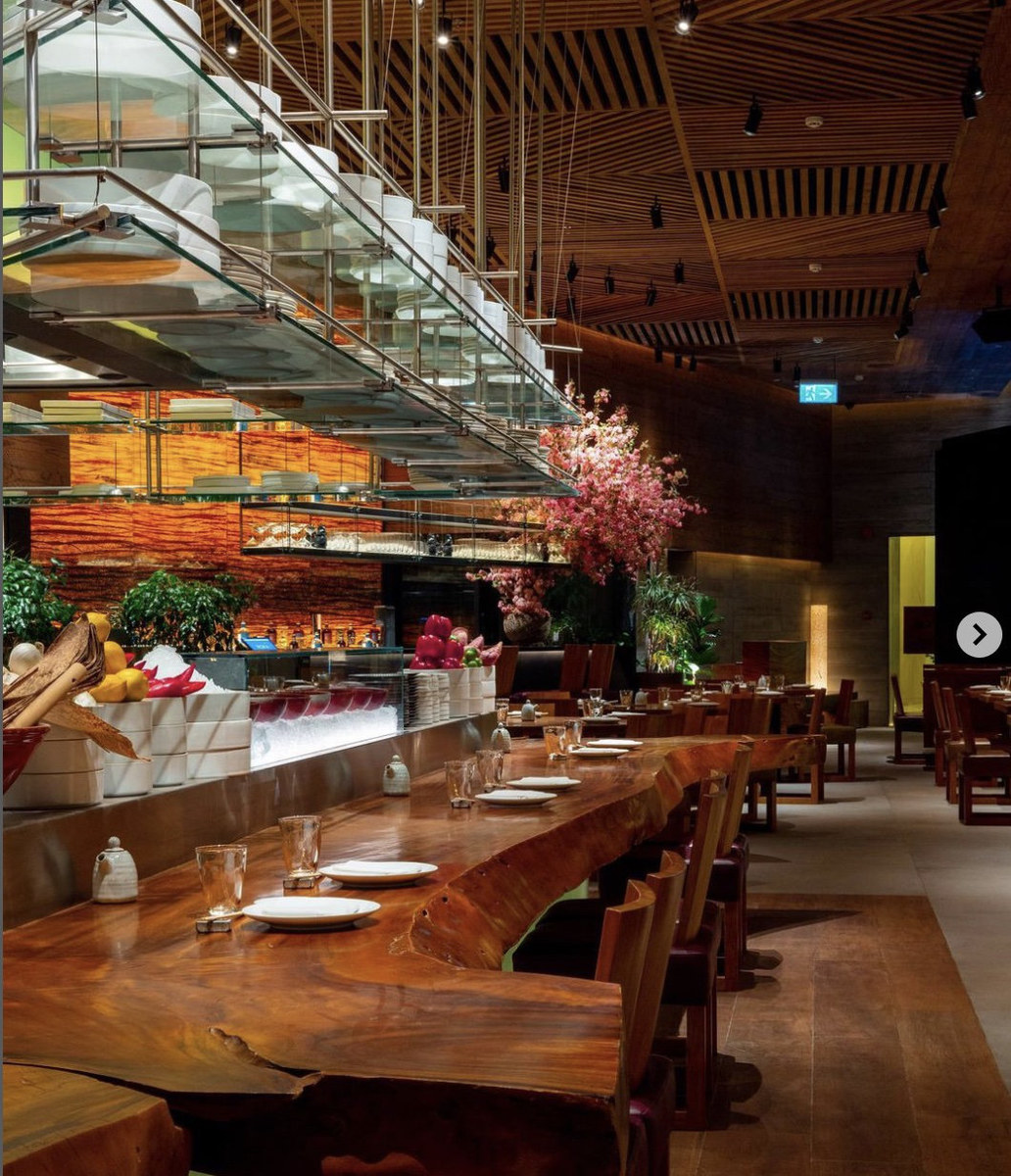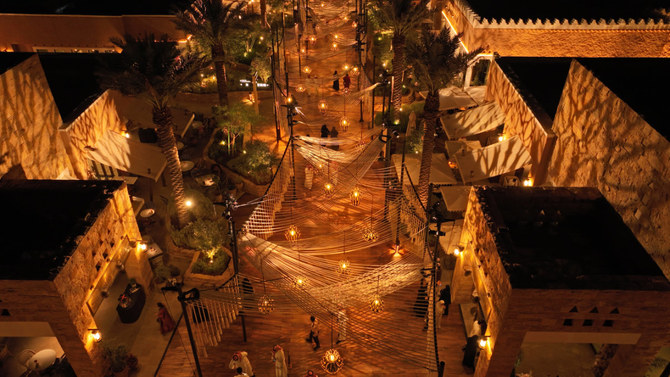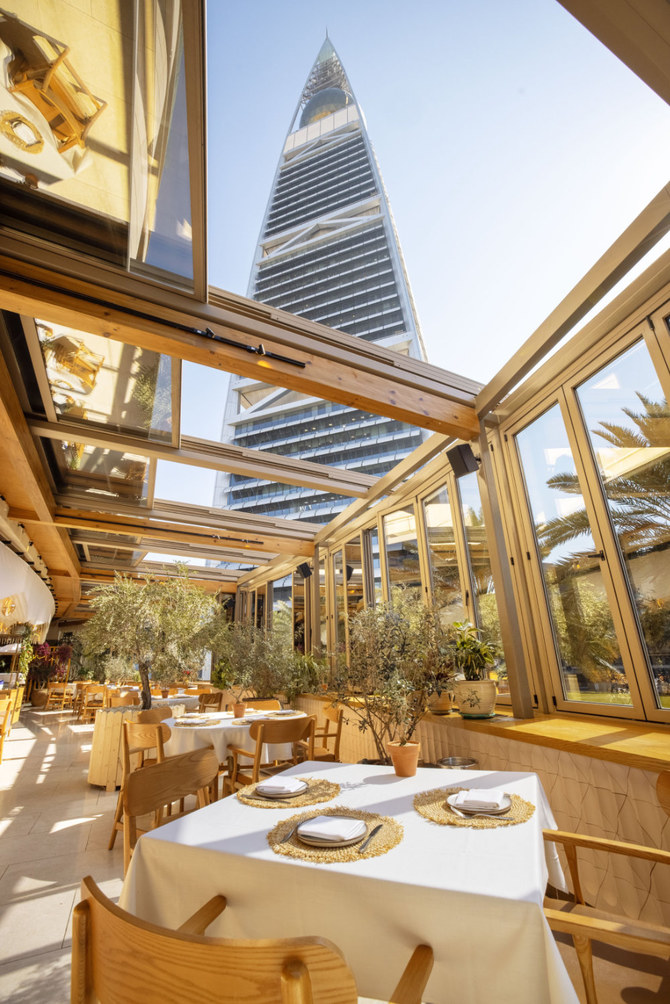RIYADH: In a high-end restaurant, polished glasses sit atop a sleekly designed wooden table surrounded by lush green plants. On the table are spreads of artfully presented Greek specialties: tzatziki, Santorini salad, eggplant dip and beef gyros tacos. At first glance, a diner might think they were in the Greek isles, or at least an upscale Mediterranean restaurant in London or Dubai.
This eatery, however, is Meraki Riyadh, the popular upscale Greek restaurant chain which first opened in London in 2017 and launched in the Mandarin Oriental Riyadh in September 2021. While Meraki would hardly shock diners in any other global city, in Riyadh — a metropolis which once had a comparatively bland food scene — it might come as a welcome surprise.

Meraki Riyadh, a popular upscale Greek restaurant chain, launched in the Mandarin Oriental Riyadh in September 2021. (Supplied)
Over the last three years, a multitude of fine dining restaurants have opened in the Saudi capital, coinciding with Saudi Arabia’s grand social and economic transformation spearheaded by Vision 2030. Crown Prince Mohammed bin Salman’s ambitious reform plan aims to increase household spending on cultural and entertainment activities to 6 percent, up 2.9 percent from when the Vision was unveiled in 2016.
Sushi, caviar, tapas, babka bread, dim sum and fondue — dozens upon dozens of international dishes are now being served in the Saudi capital as some of the world’s best restaurants and chains open alongside the rise of homegrown Saudi outfits serving a mix of traditional and fusion fare.
“Riyadh has, without a doubt, a really exciting restaurant scene,” Ciara Philips, a British cultural strategist who moved to Riyadh at the end of 2020, told Arab News.
In a country where nearly 70 percent of the population is under the age of 40, bolstering the Kingdom’s entertainment and hospitality sectors is of prime importance — not just for the influx of foreigners, but also for locals who, until a few years ago, were unable to find such a vast selection of food.

Fine dining at the new popular upscale Saudi contemporary fusion restaurant MAIZ. (Supplied)
“I’ve lived in world cities from New York, to London, Paris and Dubai … it’s up there with the best, if not surpassing, in terms of local food entrepreneurship, trendy food concepts, incredible interiors, and exceptional service and hospitality,” said Philips. “Attention to detail, as well as the love and positive embrace of the new, and a burgeoning night-time economy all add to that vibrancy.”
“This is matched with the genuine warm welcome and generosity of Saudis — food is shared and gifted so often at work and when receiving guests in the home — and I’m carrying the extra pounds to prove it,” Phillips said.
In November 2022, Saudi lifestyle curator Cool Inc announced that it would bring around 20 restaurants that hold coveted Michelin stars in their home cities are bringing their culinary offerings to Riyadh and Jeddah this year. Such names will add to the growing list of top outlets in the capital and Jeddah, which already include the Cantonese cuisine of Hakkasan, Japanese restaurant Roka, the French delicacies of La Petite Maison, and Italian fine dining restaurants such as Scallini, Angelina, and Cipriani.

Hakkasan Riyadh offers the best of Chinese cuisine at Bujairi Terrace in Diriyah. (Supplied)
In January, Cool Inc selected a diverse portfolio of international restaurants, including Wolfgang Puck’s restaurants Spago and Cut, Scott’s seafood outlet, WAGYUMAFIA, and the Indian-themed Gymkhana to open in the Saudi capital. Additionally, Cool Inc announced its Destination Dining & Member’s Clubs initiative that aims to connect the Kingdom with global industry culinary experts and visionaries.
At the end of 2022, the long-awaited Bujairi Terrace opened in the historic Diriyah district overlooking Turaif, once the original seat of the first Saudi state. Boasting a multitude of high-end Saudi and international dining experiences in an area of 15,000 square meters, its opening marked the first phase of the $50-billion project of the Diriyah Gate Development Authority.
“As a cradle of Arabian civilization for centuries, Saudi Arabia has welcomed and hosted people from across the region and the world since its inception,” Kiran Haslam, Chief Marketing Officer at Diriyah Company, told Arab News. “From the earliest traders and merchants to pilgrims journeying across the continent; scholars, architects and visionaries, Diriyah has been the epicenter of the Arabian Peninsula for hundreds of years.”

Riyadh’s Bujairi Terrace in Diriyah boasts a range of fine dining experiences. (Supplied)
“Bujairi Terrace is effectively bringing the world together through food,” Haslam said. “It offers a peerless experience in gastronomical discovery and is a perfect catalyst, much like the wider Diriyah project, for the immense progress all around us in establishing the Kingdom as a truly great global gathering place.”
Riyadh’s up-and-coming culinary status is not just due to its plethora of famous international names, however, a slew of homegrown restaurants offering Saudi cuisine with a contemporary twist are popping up all over the capital.
Under the Ministry of Culture, the Culinary Arts Commission is working to showcase and develop unique Saudi culinary traditions and position the Kingdom as a global destination for the culinary arts. The first European Food Festival under the commission was held in March this year, with the Saudi Arabian Chef’s Association hosting a contest for Saudi and international cuisine.
Inside the Takya restaurant at Burjairi Terrace, local and international diners enjoy beautifully prepared Saudi traditional dishes with a modern flair.

Takya restaurant, at Burjairi Terrace offers a contemporary fusion of traditional Saudi dishes from the country’s various regions. (Supplied)
“The idea was to create a place where people can dine in comfort and peace,” Hessah Al-Mutawa, co-owner of Takya, told Arab News. The restaurant offers a contemporary fusion of traditional Saudi dishes from the country’s various regions. The design of the restaurant, done by Hessah’s sister and restaurant co-owner Hadeel, is inspired by various Saudi architectural and cultural elements. “We want to involve the interior of the restaurant to tell a story.”
Expats living in Riyadh say the new Saudi-led restaurants are enticing and unique. However, Moe Inani, a Saudi chef based in Riyadh, believes what is still lacking in Riyadh’s growing culinary scene is a strong contingent of homegrown restaurants.
Inani, who originally hails from Jeddah, became a sous-chef at Saison, a Michelin-starred restaurant in San Francisco, where he learned to prepare sushi. He now uses his experience to create novel twists on more traditional local cuisine such as Red Sea fish.

Moe Inani, a Saudi executive chef and co-owner of Chifty restaurant, learned his craft in
San Francisco. (Supplied)
“I think the scene has definitely improved over the past couple of years, but I think most of the brands and restaurants that we have are international brands being brought from outside the Kingdom, mostly from Europe and the US by food and beverage businessmen,” Inani told Arab News. “Most of the local fine dining brands are fast food restaurants serving burgers and shawarmas.”
Inani stressed that it would take time and experience to be able to open “successful local brands.”
“For locally grown concepts, what is needed is knowledge first and foremost,” he said. “I think the country is definitely moving in the right direction to begin with by sending students or people that are interested in the culinary field to go study at different culinary schools around the world.”
Simply pursuing studies in the culinary arts, emphasizes Inani, is not enough. Experience with different foods and time are also key. “Once Saudis gain experience working with chefs abroad, they can then come back to the Kingdom and use it to help improve Saudi Arabia’s local culinary offerings,” he said.

The Japanese restaurant ROKA was an immediate hit with local food lovers when it opened in Riyadh. (Supplied)
Riyadh, Inani believes, has the potential to become a global culinary capital. But to do that, it is crucial it develops its own identity and its own chefs through locally grown concepts and experience.
Change, however, is already underway. At the new popular upscale Saudi contemporary fusion restaurant MAIZ, local and international diners eagerly drink homemade mocktails and dine on dishes such as caviar on masabeeb pancakes, featuring caviar from locally farmed sturgeon and whipped cream made with local dried limes.
“Fusion offerings at this scale weren’t available just a few years ago,” quips one diner.
As Philips puts it: “Move over, New York City: Riyadh is the city that never sleeps when it comes to incredible food on offer, from snacks to fast food to serious fine dining — you can eat what you want at all times of the day.”





























